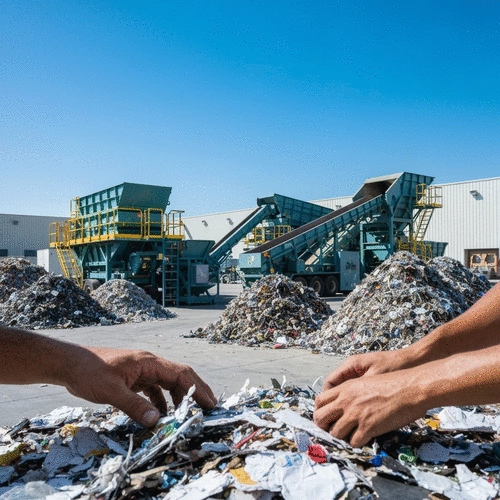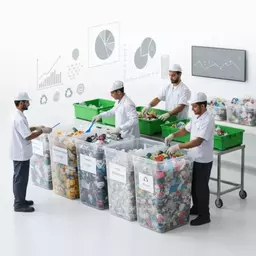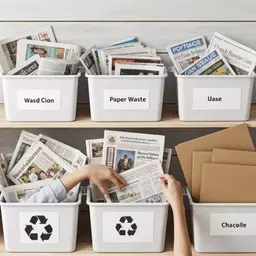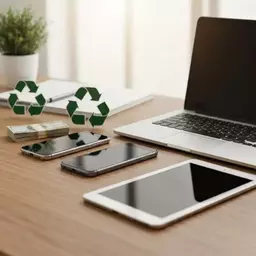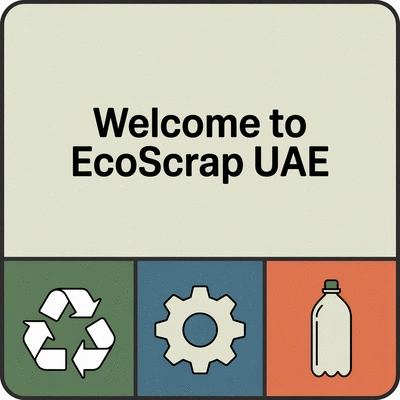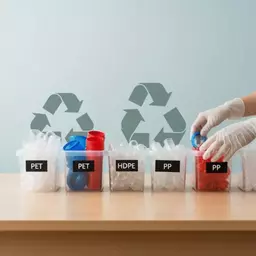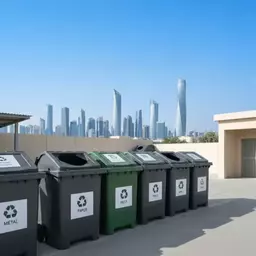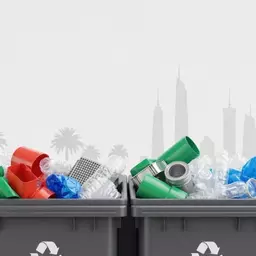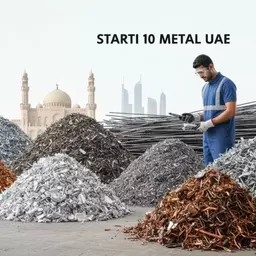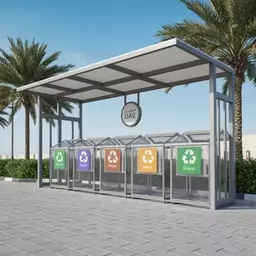What if your waste could be transformed into valuable resources? Understanding the impact of waste disposal, especially in the UAE, can empower us to make better choices for our environment and future.
What You Will Learn
- Landfills significantly contribute to greenhouse gas emissions, particularly methane, which is more effective at trapping heat than carbon dioxide.
- Only 20% of the UAE's municipal solid waste is currently recycled, highlighting the urgent need for improved recycling efforts.
- Conventional waste management methods like landfilling and incineration can lead to pollution and resource depletion, making recycling a vital alternative.
- Recycling not only conserves energy and reduces emissions but also generates economic opportunities and jobs in the recycling sector.
- Practicing waste reduction through mindful consumption can significantly decrease the amount of waste generated, benefiting the environment.
- Innovative waste management solutions in UAE cities are enhancing recycling rates and fostering community engagement towards sustainability.
UAE's Waste Management & Carbon Reduction: Key Statistics & Comparisons
This visual highlights critical statistics on waste generation, recycling rates, and the carbon-saving benefits of recycling metals in the UAE.
Annual Municipal Solid Waste (MSW) Production in UAE
3.5 Million Tons
Expected to rise with population growth.
Waste Currently Recycled in UAE
20%
Staggering amount of potential resources lost to landfills.
Landfills' Contribution to UAE's GHG Emissions
15%
Significant source of methane, a potent greenhouse gas.
Energy Saved by Recycling Aluminum
95%
Compared to producing new aluminum from raw materials.
Energy Saved by Recycling Steel
60%
Compared to producing new steel from iron ore.
Understanding the Environmental Impact of Waste Disposal in the UAE
As an environmental advocate, I understand how crucial it is to delve into the impact of waste disposal on our planet, especially in the UAE. With increasing urbanization and population growth, our waste management practices need a serious review. It's essential to comprehend that the decisions we make today about our waste can have lasting effects on the environment.
In the context of the UAE, effective waste management isn't just about keeping our surroundings clean; it’s about protecting our future. By examining the role of landfills and the impact of recycling, we can better appreciate how our actions influence greenhouse gas emissions.
The Role of Landfills in Greenhouse Gas Emissions
Landfills play a significant role in contributing to greenhouse gas emissions, particularly methane. When organic waste decomposes in landfills, it produces methane, a potent greenhouse gas that is over 25 times more effective at trapping heat in the atmosphere than carbon dioxide over a 100-year period. This is alarming because, as the waste in landfills increases, so do these emissions!
- Methane is produced when organic material decomposes anaerobically (without oxygen).
- Landfills can be significant sources of methane if not managed properly.
- Reducing landfill use is essential in mitigating climate change impacts.
These facts highlight the need for a shift toward more sustainable waste management practices. While the UAE has made strides, it's crucial for both individuals and businesses to understand our role in reducing waste, as emphasized in reports like the Draft National Strategy for Reducing Food Loss and Waste and Recycling Organics.
How Methane Production Contributes to Climate Change
Methane emissions from landfills not only exacerbate climate change, but they can also affect air quality and public health. When methane escapes into the atmosphere, it contributes to the greenhouse effect, leading to rising temperatures and unpredictable weather patterns. This is a situation we should all be concerned about! It’s why promoting recycling and responsible waste management is vital.
We can take action by reducing our reliance on landfills. By recycling materials like metals, plastics, and paper, we can significantly lower the amount of waste sent to landfills, thus reducing methane emissions.
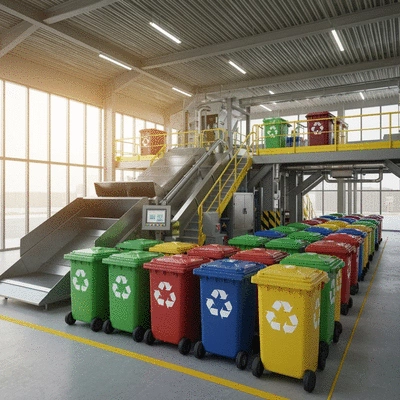
Statistics on UAE's Waste Sector and GHG Emissions
The UAE produces approximately 3.5 million tons of municipal solid waste annually, a number that is expected to rise as the population grows. Alarmingly, only a fraction of this waste is recycled. Reports suggest that just 20% of waste generated is diverted from landfills, which means a staggering amount of potential resources is lost! These statistics underscore the urgency for a change in our waste management approach.
- Only 20% of UAE's waste is currently recycled.
- Landfills account for about 15% of the UAE's total greenhouse gas emissions.
- Effective recycling programs can significantly mitigate these emissions.
Understanding these statistics can empower us to take meaningful action. If more people in the UAE engage in recycling, we could drastically reduce our waste footprint and help combat climate change.
Conventional Waste Management vs. Recycling
When we think about conventional waste management, it typically involves landfilling and incineration. These methods can be detrimental to the environment, contributing to pollution and resource depletion. At EcoScrap UAE, we believe that recycling offers a much better alternative.
- Conventional methods often waste valuable resources.
- Landfilling leads to soil and water contamination.
- Recycling conserves energy and reduces emissions.
Switching to recycling is not just a matter of preference—it’s a necessity for sustainable development. Each recyclable item processed means less waste in landfills and reduced greenhouse gas emissions.
Carbon Footprint of Traditional Disposal Methods
The carbon footprint associated with traditional disposal methods can be staggering. Burning waste in incinerators releases harmful pollutants into the atmosphere. Moreover, landfills can leach toxic substances into the ground, endangering local ecosystems. As an advocate for sustainability, I often share how recycling can significantly lessen these impacts by conserving resources and energy, as highlighted in the BETO 2023 Billion-Ton Report.
Each ton of recycled metal, for instance, can save over 1,400 pounds of iron ore, along with the associated energy and emissions. The less we need to extract and process raw materials, the better it is for our environment!
Benefits of Recycling Over Landfilling
Recycling offers numerous benefits that far outweigh those of conventional waste disposal methods. Here are just a few:
- Reduces landfill waste and consumption of natural resources.
- Conserves energy and reduces emissions.
- Generates economic opportunities and creates jobs in the recycling sector.
By choosing to recycle, we actively contribute to a healthier planet and a sustainable future. It’s a straightforward action that can lead to profound environmental benefits!
The Importance of Waste Reduction in the UAE
In addition to recycling, waste reduction is crucial for a sustainable future in the UAE. It’s about changing our mindset to minimize the amount of waste we generate in the first place. As an advocate for responsible waste management, I encourage individuals and businesses to implement strategies that prevent waste generation.
- Practice mindful consumption by purchasing only what you need.
- Opt for products with minimal packaging.
- Utilize reusable bags and containers.
These simple actions can lead to a significant reduction in waste, which is something we can all strive for. Remember, every little bit counts!
Strategies for Minimizing Waste Generation
To effectively minimize waste generation, we can adopt various strategies:
- Conduct regular audits of your waste practices.
- Educate your community on waste reduction techniques.
- Collaborate with local businesses to promote sustainable practices.
By implementing these strategies, we can collectively reduce waste in our communities and contribute to a cleaner, greener environment.
Community Engagement and Public Awareness Campaigns
Engaging the community is essential for raising awareness about the importance of waste reduction. Public awareness campaigns can inspire individuals to take action, changing their habits and encouraging participation in recycling programs. At EcoScrap UAE, we aim to foster a culture of sustainability through education and community involvement.
By spreading the knowledge about the benefits of recycling and waste reduction, we can create a communal effort towards a more sustainable future. Are you ready to join us on this journey?
Pro Tip
Did you know that by recycling just one aluminum can, you can save enough energy to power your TV for three hours? Every small action contributes to a larger impact. Consider setting up a home recycling system to make it easier for your family to participate in sustainability efforts!
How Scrap Recycling Acts as a Carbon Reduction Strategy
At EcoScrap UAE, we believe that understanding the impact of scrap recycling is vital for promoting a sustainable future. Recycling scrap metal not only reduces carbon emissions but also conserves precious resources. Let’s dive into the mechanics of how recycling scrap metal works and the emissions benefits it brings!
The Mechanics of Recycling Scrap Metal and Its Emission Benefits
Recycling scrap metal begins with the collection and sorting of metal materials. Once collected, these materials are processed in facilities equipped with specialized machinery. This process not only saves energy but also helps in reducing greenhouse gas emissions. Did you know that recycling metals like aluminum can save up to 95% of the energy needed to produce new aluminum from raw materials?
- Recycling aluminum saves energy equivalent to powering a home for several months!
- Steel recycling can save about 60% of the energy compared to producing it from iron ore.
- Reducing the extraction of virgin materials minimizes environmental disruption.
By transforming what could be waste into reusable resources, we're contributing significantly to the reduction of harmful emissions in the atmosphere. Each recycled ton of scrap metal plays a part in combating climate change!
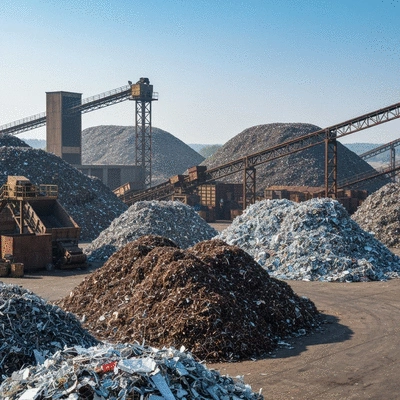
Energy Savings and Resources Conservation
One of the most compelling benefits of scrap recycling lies in its energy savings. The energy required to recycle metals is significantly less than that needed for primary production. For instance, recycling one ton of copper can save around 85% of the energy needed to extract it from ore. This substantial conservation of energy translates directly into lower carbon emissions.
Additionally, recycling reduces the demand for new raw materials, which in turn lessens the environmental impact associated with mining and extraction processes. At EcoScrap UAE, we’re proud to help conserve resources while fostering a cleaner planet!
Case Studies on Successful Scrap Recycling Initiatives in the UAE
Looking at local initiatives can provide inspiration and guidance for furthering recycling efforts. For example, the Emirates Recycling Company has successfully implemented a system that increases recycling rates across the country. This initiative not only boosted local economies but also made a positive environmental impact by diverting waste from landfills.
Through collaborative efforts, such as those seen with Dubai’s various recycling campaigns, we witness the potential for effective scrap recycling to drive sustainability in urban environments. This reinforces the critical role we all play in supporting recycling programs.
Comparative Analysis of Carbon Savings: Scrap Materials in the UAE
Understanding the differences between various materials can help us appreciate the importance of focusing on diverse recycling efforts. Let’s look at aluminum and steel as examples of how different scrap materials contribute to carbon savings.
Aluminum vs. Steel: Emission Reductions Explained
Aluminum recycling is hailed for its remarkable energy efficiency, saving around 95% of the energy needed to produce new aluminum from raw bauxite. On the other hand, recycling steel can save approximately 60% of the energy required for new production. Both metals play crucial roles in reducing emissions!
- Aluminum: 95% energy savings and substantial emissions reductions.
- Steel: 60% energy savings, contributing to lower carbon footprints.
- Both materials are infinitely recyclable, making them essential for sustainability.
This comparison highlights the need for a broad approach to recycling, ensuring that we capture the benefits from various materials used in our daily lives.
Environmental Benefits of Diversifying Recycling Efforts
Diversifying our recycling efforts has benefits that extend beyond simply reducing carbon emissions. Expanding the types of materials recycled can lead to improved sustainability outcomes, such as:
- Increased resource recovery, ensuring that valuable materials are reused.
- Reduction of landfill waste, preserving space and lowering methane emissions.
- Strengthened local economies through job creation in the recycling sector.
At EcoScrap UAE, we advocate for a comprehensive approach to recycling that encourages community involvement and recognizes the interconnectedness of environmental health and economic vitality.
The Role of the Recycling Industry in Urban Sustainability
The recycling industry is pivotal in creating sustainable urban environments. By implementing innovative waste management solutions, cities across the UAE are leading the charge towards a greener future. From advanced sorting technologies to community education programs, the recycling industry is constantly evolving.
Innovative Waste Management Solutions in UAE Cities
In cities like Abu Dhabi and Dubai, innovative waste management practices are making a significant difference. These solutions include:
- Smart bins that monitor waste levels and optimize collection routes.
- Public education campaigns that encourage responsible recycling habits.
- Partnerships with local businesses to promote recycling initiatives.
Such strategies not only enhance recycling rates but also foster community engagement and awareness about sustainability.
Impact of Recycling on Resource Recovery and Circular Economy
Recycling plays a central role in supporting a circular economy, where materials are reused and repurposed rather than discarded. This shift not only minimizes waste but also promotes sustainable production and consumption patterns. At EcoScrap UAE, we’re thrilled to be a part of this transformative journey, guiding our community towards better recycling practices, as explored in discussions around the Circular Economy and Recycling.
The impact of our collective efforts can lead to a more sustainable future, where recycling becomes second nature to all of us.
Frequently Asked Questions (FAQs)
Q1: How do landfills contribute to greenhouse gas emissions?
A1: Landfills contribute significantly to greenhouse gas emissions, particularly methane, which is produced when organic waste decomposes anaerobically. Methane is a potent greenhouse gas, far more effective at trapping heat than carbon dioxide over a 100-year period.
Q2: What percentage of waste in the UAE is currently recycled?
A2: Currently, only about 20% of the municipal solid waste generated in the UAE is recycled. This highlights a significant opportunity for improvement in waste management practices to divert more materials from landfills.
Q3: What are the main benefits of recycling over conventional waste disposal methods?
A3: Recycling offers numerous benefits, including the reduction of landfill waste, conservation of natural resources, significant energy savings, and reduction of greenhouse gas emissions. It also creates economic opportunities and jobs within the recycling sector.
Q4: How much energy can be saved by recycling aluminum and steel?
A4: Recycling aluminum can save up to 95% of the energy required to produce new aluminum from raw materials. Similarly, recycling steel can save approximately 60% of the energy needed compared to producing new steel from iron ore.
Q5: What strategies can individuals and businesses adopt to minimize waste generation?
A5: Strategies for minimizing waste include practicing mindful consumption (buying only what is needed), opting for products with minimal packaging, using reusable bags and containers, conducting regular waste audits, educating communities on waste reduction, and collaborating with local businesses to promote sustainable practices.
Recap of Key Points
Here is a quick recap of the important points discussed in the article:
- Landfills significantly contribute to greenhouse gas emissions, especially methane, highlighting the urgent need for sustainable waste management.
- Only 20% of waste in the UAE is currently recycled, underscoring the importance of improved recycling programs.
- Conventional waste management methods are harmful to the environment; recycling is a vital alternative that conserves resources and energy.
- Practicing waste reduction through mindful consumption and community engagement can lead to substantial sustainability benefits.
- Innovative waste management solutions in UAE cities are essential for fostering a culture of recycling and sustainability.

